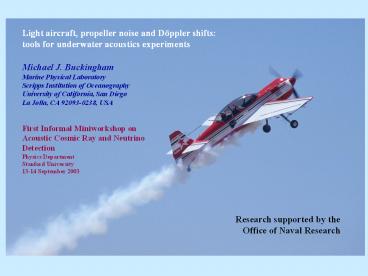Light aircraft, propeller noise and D - PowerPoint PPT Presentation
Title:
Light aircraft, propeller noise and D
Description:
Light aircraft, propeller noise and Dppler shifts: – PowerPoint PPT presentation
Number of Views:118
Avg rating:3.0/5.0
Title: Light aircraft, propeller noise and D
1
Light aircraft, propeller noise and Döppler
shifts tools for underwater acoustics experiments
Michael J. Buckingham Marine Physical
Laboratory Scripps Institution of
Oceanography University of California, San
Diego La Jolla, CA 92093-0238, USA
First Informal Miniworkshop on Acoustic Cosmic
Ray and Neutrino Detection Physics
Department Stanford University 13-14 September
2003
Research supported by the Office of Naval Research
2
BAC 111, Keflavik, Iceland
3
East Greenland
4
Marginal Ice Zone, Greenland Sea
5
Icebergs, Scoresby Sund, East Greenland
6
Low-frequency sound speed in sediments
1. Aircraft sound sources (50 - 1000
Hz) 2. Measured propeller noise spectra in
air with aircraft stationary on
ground 3. Measured (in flight) propeller noise
spectra a) in air (microphone) b) in seawater
(hydrophone) c) in sediment (buried
hydrophone) 4. Döppler measurements of
low-frequency (lt 1 kHz) sound speed in
air/seawater/sediment 5. Wave types in shallow
water channels 6. Looking to the future
7
(No Transcript)
8
(No Transcript)
9
(No Transcript)
10
(No Transcript)
11
(No Transcript)
12
(No Transcript)
13
(No Transcript)
14
(No Transcript)
15
(No Transcript)
16
(No Transcript)
17
(No Transcript)
18
Data from July 2, 2002
- Temperature and pressure profile (Sea-Bird TP
Profiler SBE 39) - Microphone 1 m above the air/sea interface
- 7 Hydrophones spanning much of the 15 m water
column - Buried hydrophone
19
Some Preliminary Resultsfor Sediment Sound Speeds
- Used minimization technique with a cost function
that maximized power along Doppler shift curve - Started with microphone data get v, h, ca, t0
and f0 - Proceeded to water column and sediment to get
cw,cs
20
(No Transcript)
21
Application of Minimization Technique to Air Data
- Microphone data
- Predicts average sound speed in air (342.3 m/s)
consistent with temperature conditions (343.5m/s) - Showed a flight direction bias of about 5 m/s,
consistent with a wind effect (verified in GPS
data) - Average aircraft velocity (54.5 m/s) in good
agreement with average velocity from GPS data
(54.8 m/s)
22
(No Transcript)
23
(No Transcript)
24
Water and Sediment Data
- Water data
- Acoustic data
- c 1529.5 m/s
- ? 23.4 m/s
- Sea-Bird data
- c 1512.4 m/s
- Sediment data
- Acoustic data
- c 1649 m/s
- ? 23.6 m/s
25
(No Transcript)
26
Future measurements using an aircraft sound source
Sediment sensors a) in-situ sediment sound speed
(Döppler difference frequency) b) in-situ
sediment attenuation (one or more buried phones)
Water column sensors a) sediment sound speed
(Döppler difference frequency of head
wave) b) sediment density porosity (near
normal incidence reflection coefficient)
27
Looking ahead ..
28
Diamond Star DA40, Palomar, CA
29
Super Decathlon (aerobatic)
30
James Bond SeaBee (amphibian)
31
DHC Otter and Cessna 206, Honolulu
32
Cessna 206, Honolulu
33
Honolulu
34
Jurassic Park, Oahu
35
Casa Saeta, Spanish jet (sonic boom research)
36
(No Transcript)
37
(No Transcript)














![Green[er]-to-Green Aircraft/Aeronautical Possibilities PowerPoint PPT Presentation](https://s3.amazonaws.com/images.powershow.com/4042938.th0.jpg?_=201306221111)
















